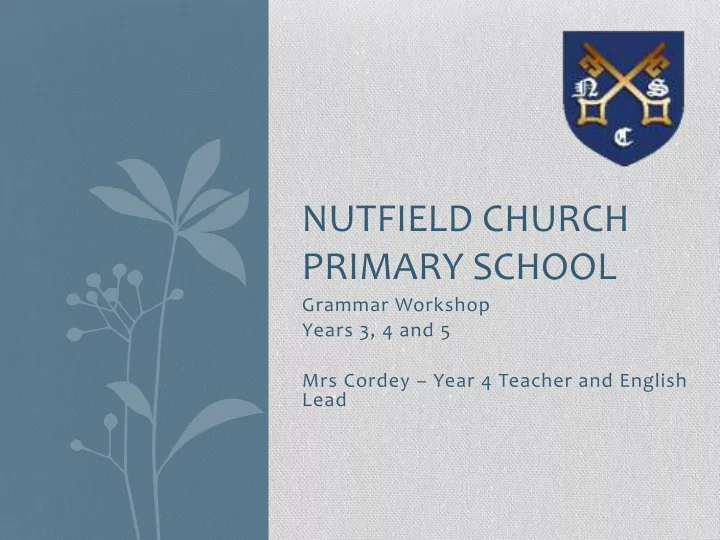

NUTFIELD CHURCH PRIMARY SCHOOL Grammar Workshop Years 3, 4 and 5 Mrs Cordey – Year 4 Teacher and English Lead
Agenda - Key Grammar Terminology For Year Groups - Practical Examples - Questions
How do we teach grammar at Nutfield Church? • Grammar is embedded in our daily English lessons • Key vocabulary is displayed within our classrooms • Learning objectives are linked to explicit skills • English interventions are given to those requiring extra support • KS2 classes also teach grammar exclusively • Weekly spelling tests
How do we teach grammar at Nutfield Church? Otherwise known in most schools as….. E nglish G rammar P unctuation S pelling
Year 3
Year 4
Year 5
Key Terminology • Noun • Prefix • Conjunction • Adverb • Preposition • Verb • Plural and possessive apostrophe • Fronted adverbial • Adjective • Suffix • Relative clause • Modal verb • Parenthesis
Grammar and spelling terms • Noun – a person, animal, place or thing • Prefix – a prefix is added at the beginning of a word in order to turn it into another word. • Adjective – a word that describes a noun • Conjunction – links sentences together ie and, so and but • Adverb – add more detail to the verb eg how, when or where something happened • Preposition – explains position in relation to something else • Verb – an action word • Suffix - is an ‘ending’, used at the end of one word to turn it into another word. Unlike root words, suffixes cannot stand on their own as a complete word
Grammar and spelling terms • Plural and possessive apostrophe • Fronted adverbial – a word or phrase that normally comes after the verb may be moved before the verb: when this happens, we say it has been ‘fronted’. For example, a fronted adverbial is an adverbial which has been moved before the verb. When writing fronted phrases, we often follow them with a comma. • Relative clause - a special type of subordinate clause that modifies a noun. It often does this by using a relative pronoun such as who or that to refer back to that noun, though the relative pronoun that is often omitted. • Modal verb - used to change the meaning of other verbs. They can express meanings such as certainty, ability, or obligation. The main modal verbs are will, would, can, could, may, might, shall, should, must and ought . • Parenthesis - a word or phrase inserted as an explanation or afterthought into a passage which is grammatically complete without it, in writing usually marked off by brackets, dashes, or commas.
What is grammar? “Grammar is the business of taking a language to pieces to see how it works.” – Professor David Crystal Grammar provides the ‘rules’ for joining words and phrases into sentences. The function of a word or phrase within a sentence is key to understanding grammar so a good place to start is to encourage children to love reading and to experience quality written language.
Let’s look at some examples! So there are different types of nouns – do you know what they are? - Common nouns - Proper nouns - Abstract nouns - Pronouns
Let’s look at some examples! Sort these nouns into common nouns, proper nouns, abstract nouns and pronouns. his shop wales tesco dad dog primary school thoughtfulness her elephant i bradley brother joe mum table plymouth happiness
We mustn’t forget the ANSWERS!! capital letters on the proper nouns his shop Wales Tesco Dad dog primary school thoughtfulness her elephant I Bradley brother Joe Mum table Plymouth happiness
Let’s look at some examples! Verbs A verb is a word that describes actions. A verb tells us what someone is doing or what is happening. The farmer drives his tractor. This is a verb. It tells us what the farmer is doing. It is describing the action.
Let’s look at some examples! Verbs 1.Ben enjoyed watching TV. 2.Suzy enjoyed watching TV while eating cake. 3.I like playing football with Raj on the field. 4.He is huge! 5.Eating cake is one of my favourite hobbies! 6.Quietly she wandered into the hall while it was dark. 7.I am being very noisy today! 8.My dog and I are enjoying our walk.
Let’s look at some examples! Adjectives
Let’s look at some examples! Adverbs Shirley ran ________________ to the castle and crept ____________ up the stairs. While I milked the cow _____________, he ___________ groomed the horse. The child _______________ shouted at the man who was running ____________ .
Let’s look at some examples! Prefixes and suffixes. Do you know the difference? https://www.youtube.com/watch?v=H2Z4p0au1yk
Let’s look at some examples! Fronted Adverbials
Let’s look at some examples! Apostrophes – possession or contraction?
Let’s look at some examples! Apostrophes 1. The girl’s bag is heavy. 2. I wouldn’t go in there if I were you. 3. She wanted to see Billy’s new book. 4. The frogs were croaking in Ben’s face. 5. I’m going to get you! 6. I couldn’t find the peg. 7. She’d like to meet you. 8. Can I see Sarah’s homework please? 9. I can’t do it! 10. Sally’s hair is the prettiest.
Let’s look at some examples! Relative clauses These give extra information about the noun before, using who, which, why, where, that, whose.
Let’s look at some examples! Parenthesis And now a video…. https://www.bbc.co.uk/education/clips/zskmhv4
Spelling Test!
The Answers!
Spellings – how can you help? • Play a game • Use a dictionary • Use acronyms or association
Resources to support at home www.oxfordowl.co.uk www.topmarks.co.uk www.bbcbitesize.co.uk www.grammarsaurus.co.uk Use the internet – YouTube has so many songs to make it fun!
Recommend
More recommend